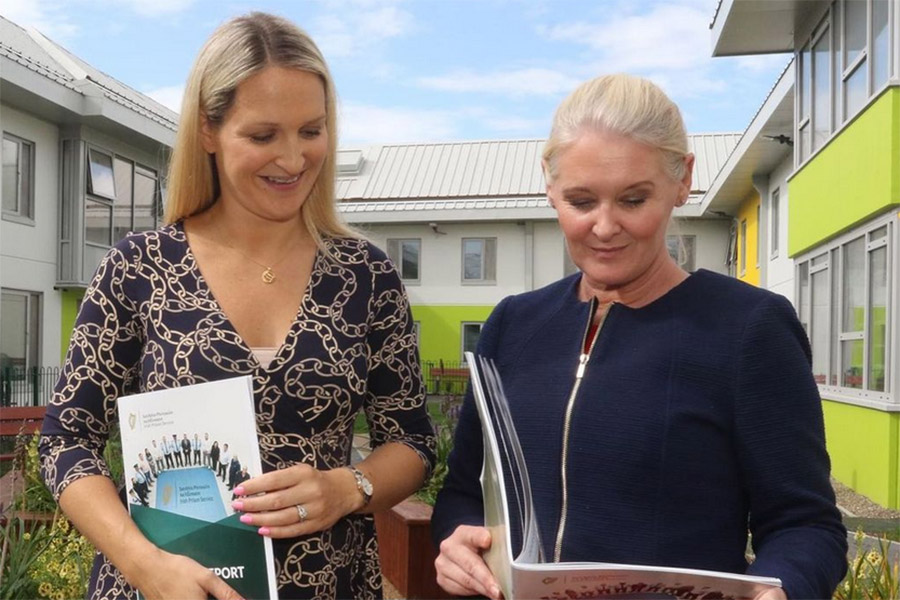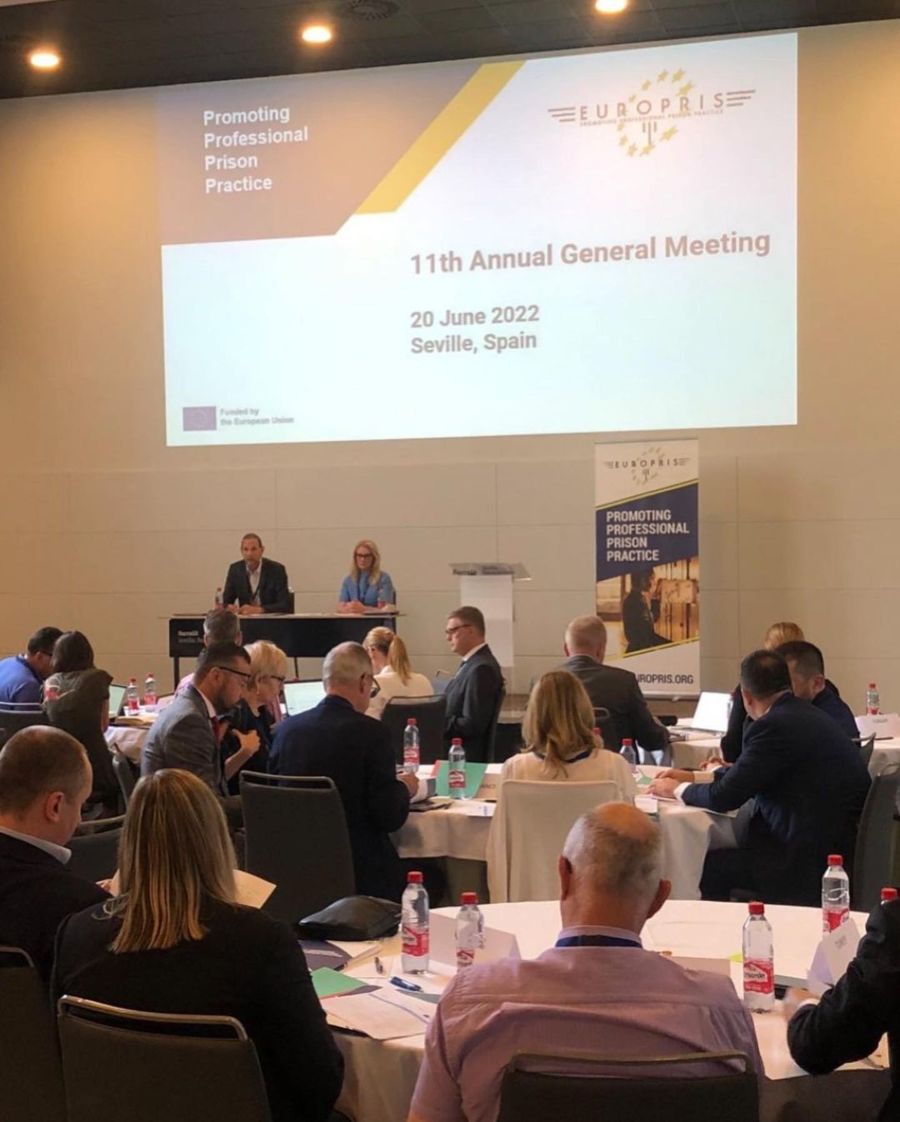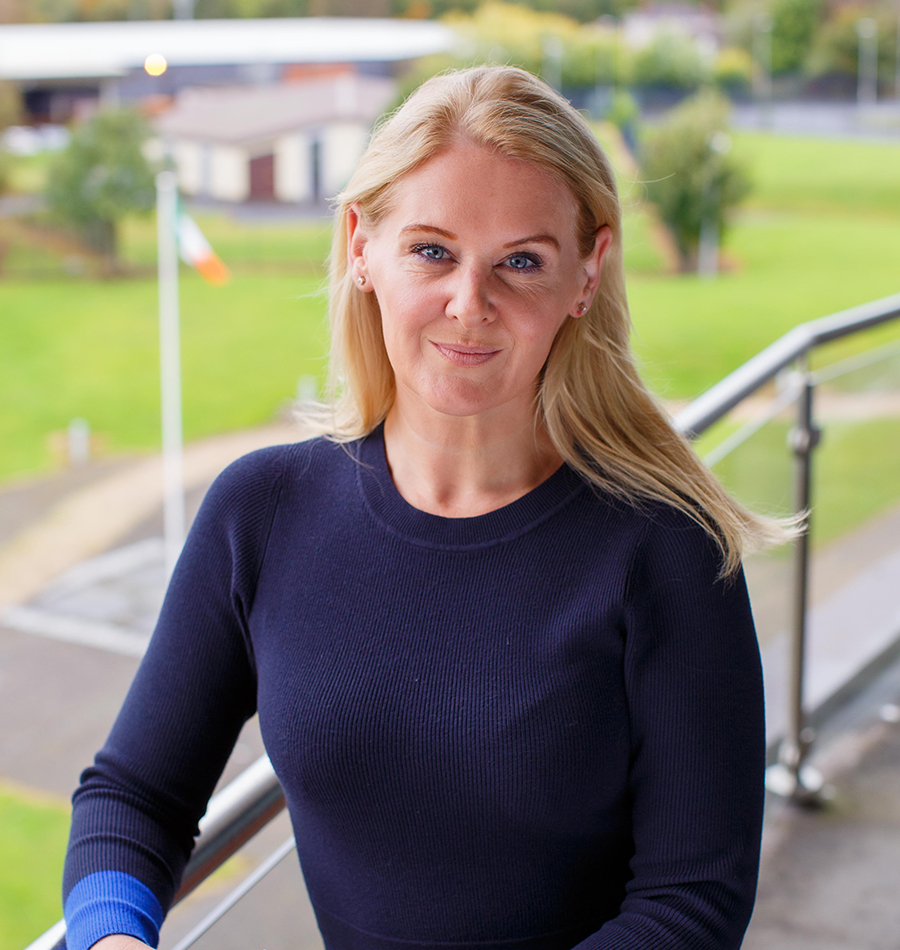Interview
Caron McCaffrey
Director-General of the Irish Prison Service & President of EuroPris
Caron McCaffrey was appointed Director General of the Irish Prison Service in December 2018 and is responsible for managing an annual budget of 395 million euros. She is the first woman to hold the highest leadership position in the Irish Prison Service, where she has been spearheading key strategic changes.
The new strategy, launched in 2019, was shaken by the challenges resulting from the pandemic, but in this interview, Director McCaffrey reveals that her administration remained focused on enhancing the services provided to inmates and improving and expanding the prison estate, among other major goals.
Since October 2021 she has also been the President of EuroPris (the European Organisation of Prison and Correctional Services). At EuroPris she is committed to developing expertise, best practices and professionalism within the prison sector.
JT: In your foreword of the Irish Prison Service Strategic Plan 2019-2022, you explain that the strategy has been built around five pillars: staff support, prisoner support, safe and secure custody, the prison estate, and governance.
Could you give us an account of your action plan for achieving the goals under each one of those pillars? What is the state of implementation of your strategy for the agency, and how will it evolve going forward?
CM: In 2019, the Irish Prison Service set out an ambitious plan for service improvement and development in our new Statement of Strategy.
This Strategy was to be our roadmap for implementing our priorities for the years ahead. At that time, no one knew what lay ahead and the impact that the pandemic would have on all of society.
While managing the challenges of COVID-19 became our main focus in March 2020, continuing to deliver on the objectives set out in our Strategy remained firmly in our plans. I am pleased to say that considerable progress has been made since 2019, with most actions either achieved or nearing completion.
Enhancing the delivery of services for prisoners has continued to be a priority for our Service, including the delivery of prisoner healthcare.
Significant progress has been achieved through the completion of a Health Needs Assessment and our participation in the Interdepartmental Taskforce on Mental Health. We have also continued to enhance our resources for providing psychological support for prisoners, which has allowed us to rethink the delivery of certain treatment programmes, including interventions for sex offenders.
The modernisation of the prison estate has continued despite the challenges experienced in the construction industry due to COVID-19.
We have made huge progress on the construction of new facilities in Limerick Prison. This project will transform the facilities available in Limerick, especially for women offenders.
We have also recently introduced a revised governance structure, including a new operating model for our senior management teams and forums. We have just commenced the rollout of our new Functional Structure at the local level, which will deliver better working between prisons and headquarters, thus enhancing accountability and compliance. We have also greatly enhanced risk management by developing a new Risk Management Framework.
We are currently working on a new Strategic Plan through which we will build on recent reforms and take account of our experiences and learning from the past two years.
Innovation and digitalisation will be at the fore of our future strategic planning, which will build on some of the highly innovative projects rolled out during the pandemic.

JT: “Overcrowding re-emerged in 2018 after a period of reducing numbers within the prison system. The early figures for 2019 illustrate that this is likely to continue”. This has been reported by the Office of the Inspector of Prisons in their 2018 annual report. The pandemic will have alleviated the overrun capacity situation in 2020-2021. Still, the risk of prisons becoming overcrowded again is feared, which is mentioned by organisations advocating penal reform.
To what extent does the level of overcrowding hinder your management goals? What role can you play in further developing the implementation of alternatives to incarceration?
CM: Unfortunately, pressure on numbers within prison systems is not a new phenomenon. Overcrowding has been experienced in the past, and we have learned that it is a significant barrier to rehabilitation. Fortunately, we could keep prisoner numbers manageable during the pandemic, which has allowed us to implement adequate infection control arrangements. However, with a return to more normal levels of activity within the criminal justice system, increasing prisoner numbers are expected over the coming years.
Providing additional prison places is critical to address overcrowding, and we continue to invest in the prison estate. In July 2022, we reopened the Training Unit Place of Detention (in Dublin) which has provided an additional 96 spaces for older prisoners. The opening of new accommodation in Limerick will provide us with an additional 90 male and 22 female spaces in the coming months.
However, the provision of additional prison spaces is not delivered overnight and is expensive in terms of construction and running costs. Therefore, we must continue to ensure that prison is reserved for those who pose the most serious risk to public safety.
To that effect, I was recently involved in the Review of Policy Options for Prisons and Penal Reform which has now been published by Minister McEntee.
Among the issues, the review recommends reducing the use of short custodial sentences (especially sentences under 3 months) and exploring how the judiciary can be provided with a greater range of non-custodial sanctions.
Community sanctions can play a role in addressing criminality, reducing reoffending, and providing protection to the public while holding the individual accountable. Non-custodial sentences, which include sentencing a person to undertake community service, mean that a person can retain links to their community. This improves the chances that they will not reoffend and untimely leads to a safer society.
The Review of Policy Options for Prison and Penal Reform 2022-2024 lays out six priority actions that have been identified to reduce reoffending, support desistance from offending, avoid overcrowding in prisons and reduce reliance on custodial sentences as the primary criminal sanction.
Another priority is to take forward the established taskforce implementation plan regarding the mental health and addiction challenges of those imprisoned and primary care support on release.
We need to ensure that all criminal justice policy decisions are pre-assessed to determine, as far as possible, their impact across the criminal justice sector. Furthermore, there is a need to establish a Penal Policy Consultative Council.
One last priority is to introduce judicial discretion to set minimum tariffs for life sentences and examine the effectiveness of the use of mandatory minimum sentences for certain crimes.

What have been the main challenges and opportunities that the COVID-19 pandemic brought along to the Irish Prison Service?
CM: It has been a truly remarkable and challenging period as we sought to keep all those who live and work in our prisons safe. As a Service, we have proven to be adaptable, flexible, resilient, and highly innovative. Our staff has embraced the challenges with professionalism and dedication.
The year 2020 saw the introduction of new innovative methods of service delivery, including the delivery of teleservices for Chaplaincy and psychology and the introduction of electronic money transfer systems.
We also implemented virtual visitation with family and friends using video conferencing technology; and introduced in-cell telephones to help prisoners keep in contact with their loved ones and to support their mental health.
As a result, we continued to provide the best possible service to prisoners in our care and their families.
As we have moved into a less restricted environment across the estate, many of these new systems have been permanently retained for the delivery of services and for supporting prisoners.
JT: A specific challenge facing the Irish prison system concerns some particularities of the prison population, namely the increase of women and elderly inmates and gangs in prisons.
How does the Irish Prison Service deal with the specifics of these types of inmates?
CM: In recent decades, significant demographic changes in Ireland have led to a greater diversity of the Irish population, which is reflected among those who come into contact with the criminal justice system.
Each of our prisons has its own regime and caters to the needs of those in custody. All prisoner’s sentences are managed through prison-based Integrated Sentence Management (ISM) Coordinators, supported by prison management and the prison-based multi-disciplinary teams. This includes the Education Service, the Work Training Service, the Chaplaincy Service, the Probation Service, the Psychology Service, the Training & Employment Service, the Resettlement Service, and the Healthcare & Addiction Service. These teams work with operational staff to deliver effective sentence management and prisoner care.
Integrated Sentence Management Coordinators are also active participants in sentence planning for specific categories of prisoners serving less than one year. For example, female prisoners, prisoners who have declared their risk of homelessness on release, or prisoners participating in the Community Support Scheme.
The Community Support Scheme is an initiative targeting offenders serving short sentences ranging from 3 months up to 12 months and targets offenders’ shortly after committal. This Scheme seeks to identify risk factors, make appropriate referrals, and prepare a sentence management plan for each case.
The Irish Prison Service engages with An Garda Síochana (Irish national police service) with regard to identifying members of criminal groups from conducting criminal activities while in custody and preventing them from exerting inappropriate influence over other persons.
Examples of this are the security initiatives undertaken by our Operational Support Group (OSG), which have made it more difficult for prisoners to engage in illegal activities while in prison. Staff continues to conduct the use of random and intelligence-led cell searches daily. Our Canine Unit carries out searches around the prisons and is also dedicated to searching deliveries. Recent examples of this happened in Mountjoy Prison, where two of the biggest seizures of contraband to date were recorded. Advancements in our drug detection technology have proved remarkably effective.
The core function of the Operational Support Group includes the gathering and collating of intelligence information on members of criminal groups in custody, carrying out intelligence-led searches, and preventing the flow of contraband, including mobile phones, into the prisons.
Many Prison Services face common challenges and opportunities. I very much value that through individual [Prison] Services being active as part of the EuroPris network, we can share our learning and stay proactive, allowing us to become first-class agencies, firmly contributing to safer communities for all.

JT: In addition to leading the Irish Prison Service, you are President of EuroPris, heading its Board.
Please tell us about your role at EuroPris and the importance of being involved in the international correctional arena.
CM: I have been a EuroPris board member since 2019 and was elected President in October 2021. I am committed to furthering the work of EuroPris, and I am also a believer in the mission and vision to, among other things, be a centre of expertise for prison services across Europe and develop best practices and professionalism within our profession.
Never before has the value of EuroPris been so demonstrable and vital. The last three years have been a time of growth and development for EuroPris. Together we worked hard to facilitate the sharing of information on COVID-19 with our members, as well as developing our online events capability and enhancing our communication and information sharing platforms.
I believe that the value of EuroPris has been realised and strengthened over the past three years, and I very much look forward to building on this success in the future.
The Corporate Governance landscape has changed significantly in the decade EuroPris has been in operation. As a Board, we thought it was time to review the articles of association to bring them in line with good corporate governance practices. So, in November 2021, I initiated a review of those articles, which underpin the organisation.
At our last Annual General Meeting, there was a strong preference for an increased focus on communication and online presence. This has been a topic to which I have given a lot of consideration during the year with the express aim of ensuring that our sharing of best practices reaches those working on the front line.
Many Prison Services face common challenges and opportunities. I very much value that through individual [Prison] Services being active as part of the EuroPris network, we can share our learning and stay proactive, allowing us to become first-class agencies, firmly contributing to safer communities for all.
Caron McCaffrey
Director-General of the Irish Prison Service & President of EuroPris
Caron McCaffrey was appointed Director General of the Irish Prison Service in December 2018. She worked in the justice sector for many years before taking up a role in the Irish Prison Service in 2006. She has since held responsibility for various portfolios. Ms McCaffrey is also President of EuroPris – the European Organisation of Prison and Correctional Services. She graduated from NUI Maynooth (BA) and Dublin City University (MA International Relations), holds an Advanced Diploma in Applied Employment Law from the King’s Inns, and has a Postgraduate Diploma in Corporate Governance from the UCD Smurfit Business School.


